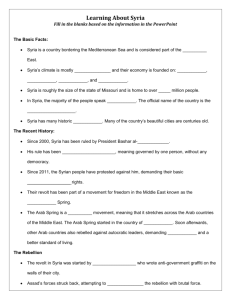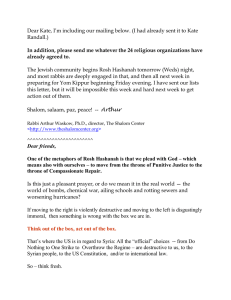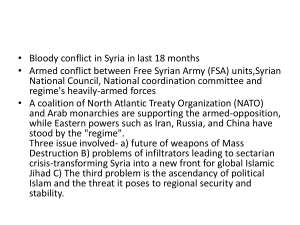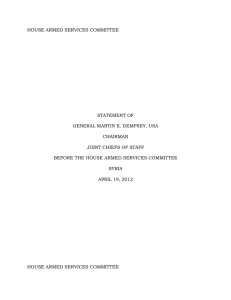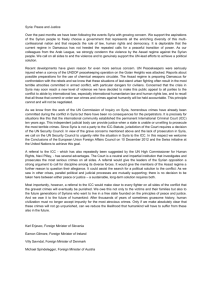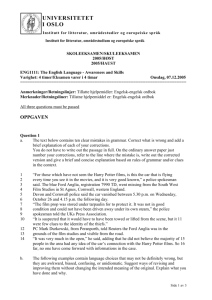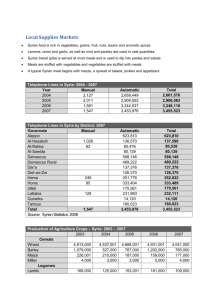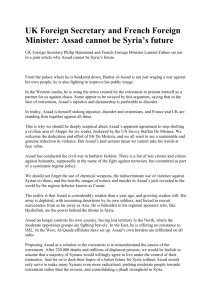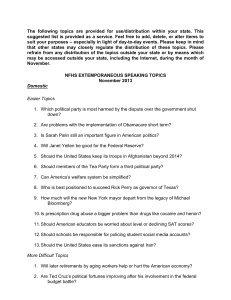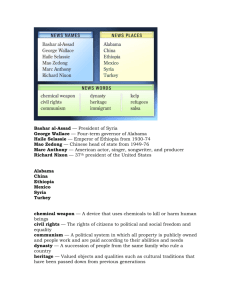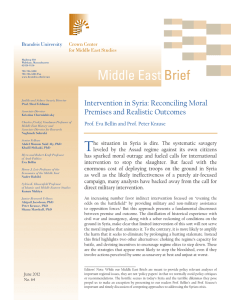SECRETARY OF DEFENSE LEON E. PANETTA STATEMENT ON SYRIA
advertisement
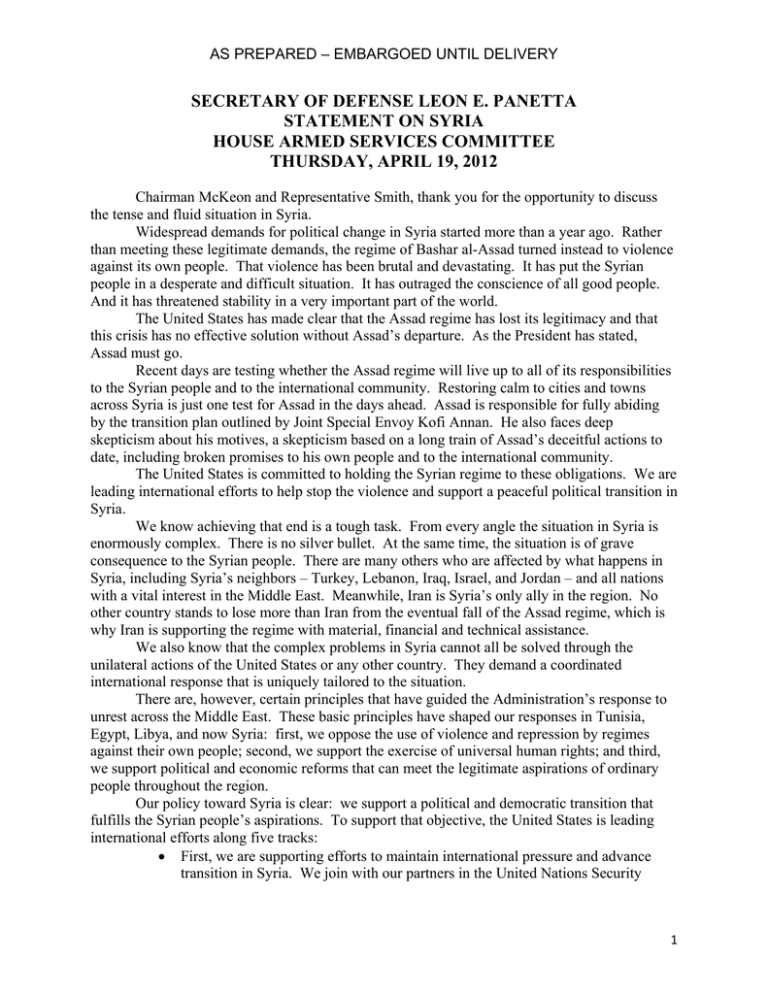
AS PREPARED – EMBARGOED UNTIL DELIVERY SECRETARY OF DEFENSE LEON E. PANETTA STATEMENT ON SYRIA HOUSE ARMED SERVICES COMMITTEE THURSDAY, APRIL 19, 2012 Chairman McKeon and Representative Smith, thank you for the opportunity to discuss the tense and fluid situation in Syria. Widespread demands for political change in Syria started more than a year ago. Rather than meeting these legitimate demands, the regime of Bashar al-Assad turned instead to violence against its own people. That violence has been brutal and devastating. It has put the Syrian people in a desperate and difficult situation. It has outraged the conscience of all good people. And it has threatened stability in a very important part of the world. The United States has made clear that the Assad regime has lost its legitimacy and that this crisis has no effective solution without Assad’s departure. As the President has stated, Assad must go. Recent days are testing whether the Assad regime will live up to all of its responsibilities to the Syrian people and to the international community. Restoring calm to cities and towns across Syria is just one test for Assad in the days ahead. Assad is responsible for fully abiding by the transition plan outlined by Joint Special Envoy Kofi Annan. He also faces deep skepticism about his motives, a skepticism based on a long train of Assad’s deceitful actions to date, including broken promises to his own people and to the international community. The United States is committed to holding the Syrian regime to these obligations. We are leading international efforts to help stop the violence and support a peaceful political transition in Syria. We know achieving that end is a tough task. From every angle the situation in Syria is enormously complex. There is no silver bullet. At the same time, the situation is of grave consequence to the Syrian people. There are many others who are affected by what happens in Syria, including Syria’s neighbors – Turkey, Lebanon, Iraq, Israel, and Jordan – and all nations with a vital interest in the Middle East. Meanwhile, Iran is Syria’s only ally in the region. No other country stands to lose more than Iran from the eventual fall of the Assad regime, which is why Iran is supporting the regime with material, financial and technical assistance. We also know that the complex problems in Syria cannot all be solved through the unilateral actions of the United States or any other country. They demand a coordinated international response that is uniquely tailored to the situation. There are, however, certain principles that have guided the Administration’s response to unrest across the Middle East. These basic principles have shaped our responses in Tunisia, Egypt, Libya, and now Syria: first, we oppose the use of violence and repression by regimes against their own people; second, we support the exercise of universal human rights; and third, we support political and economic reforms that can meet the legitimate aspirations of ordinary people throughout the region. Our policy toward Syria is clear: we support a political and democratic transition that fulfills the Syrian people’s aspirations. To support that objective, the United States is leading international efforts along five tracks: First, we are supporting efforts to maintain international pressure and advance transition in Syria. We join with our partners in the United Nations Security 1 AS PREPARED – EMBARGOED UNTIL DELIVERY Council, including Russia and China, in calling for the urgent, comprehensive, and immediate implementation of all aspects of the Annan plan. Second, we are further isolating the Assad regime. We are encouraging other countries to join the United States, the European Union, and the Arab League in imposing strong sanctions against it. These sanctions are putting Assad under greater pressure than ever before; Third, we are strengthening and unifying the non-violent political opposition in Syria. The United States is in the process of providing direct non-lethal support, including communications and medical equipment, to the civilian-led opposition. We are taking these actions in concert with similar steps taken by the Friends of Syria and other international partners to assist the opposition; Fourth, we are providing emergency humanitarian assistance to the Syrian people, and we are working to broaden our efforts at relief, with a total commitment so far of $25 million; and Fifth, we are reviewing and planning for a range of additional measures that may be necessary to protect the Syrian people. By acting along these lines, we are increasing pressure on the Assad regime every day. Make no mistake – one way or another, this regime ultimately will meet its end. There are legitimate questions about what steps are necessary to achieve this end, with some arguing for an approach similar to the one we took in Libya. The fact is that our recent experience in Libya is helping to inform the approach of the United States to Syria: First, our efforts are strengthened by multi-lateral, international consensus; Second, we should maintain clear regional support from the Arab world; Third, we should offer substantial U.S. contributions where we can bring unique resources to bear; Fourth, we should have a clear legal basis for our approach; Fifth, and finally, our approach must keep all options on the table, while recognizing the limitations of military force. But the situation in Syria is different from the one in Libya in important ways: In Libya, there was widespread international support in the Arab world and elsewhere, and clear Security Council authorization, for military intervention. No such consensus currently exists regarding Syria; The opposition is not as well organized and does not control territory; We must also be mindful, as Secretary Clinton has noted, of the possibility that outside military intervention will make a volatile situation even worse, and place even more innocent civilians at risk. The United States has made clear that we are on the side of the Syrian people. They must know that the international community has not underestimated either their suffering or their impatience. The Defense Department has reviewed and is continuing to plan for a variety of possible scenarios should the President determine that further steps are necessary. In the meantime, our only clear path is to keep moving diplomatically in a resolute and deliberate manner with the international community to find a way to return Syria to the Syrian people. Thank you. ### 2
